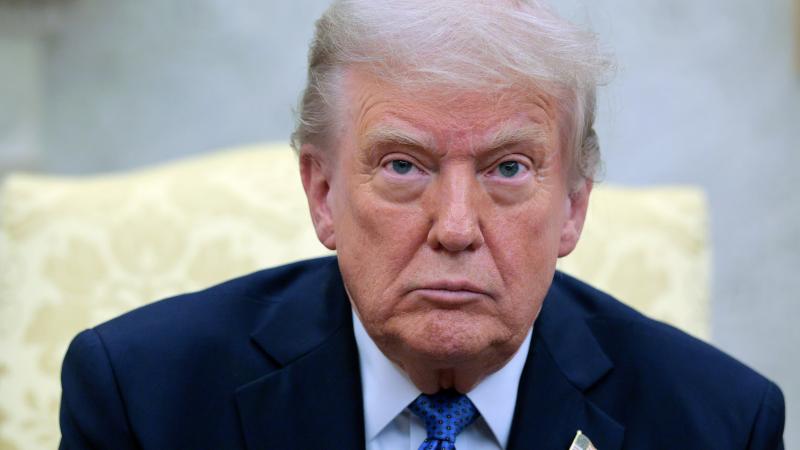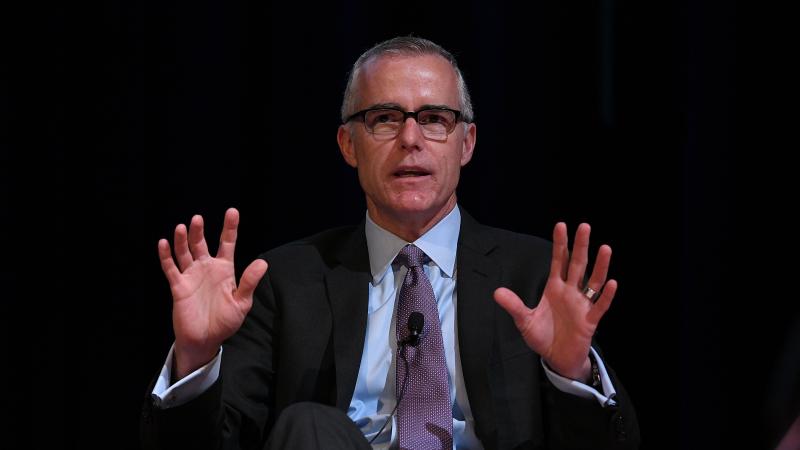Washington Post and Pulitzer Board keep mum on prize-winning but debunked Trump-Russia stories
Democracy Dies in Darkness? Neither the WaPo nor the Pulitzer Board want to talk about the prize-winning Trump-Russia collusion story which the whole world now knows was based on a hoax. The collusion narrative was debunked years ago, but with little fanfare.
The Washington Post and the Pulitzer Prize Board are refusing to answer questions about an award-winning 2017-story that relied on the Trump-Russia collusion hoax — an article which a key player in the story told investigators long ago was “wrong.”
Just the News reported earlier this month that former National Security Agency Director Mike Rogers told FBI agents that the crux of a Pulitzer Prize award-winning Washington Post story on the Russian collusion hoax was “wrong.” More than two weeks later the release of those documents, neither the outlet -- whose branding is "Democracy Dies in Darkness" -- nor the board responsible for arguably the most prestigious award in journalism, are answering questions about the refutation by Rogers, which was revealed in newly-declassified Crossfire Hurricane files.
Prize-winning story rebuked only one month after publication
Admiral Rogers, who retired in 2018 after four years as NSA chief and commander of U.S. Cyber Command, spoke with FBI agents and a key member of special counsel Robert Mueller’s team in June 2017, where he dismantled a May 2017 story by the Post titled, “Trump asked intelligence chiefs to push back against FBI collusion probe after Comey revealed its existence.”
The Post story would go on to be among the Russiagate stories published by the outlet to win a Pulitzer Prize for "a distinguished example of reporting on national affairs" in 2018. Trump is currently suing the Pulitzer Board for defamation for continuing to defend the awards it gave to this collusion-related story and others.
After two weeks and multiple requests for comment, the Pulitzer Prize Board and the Washington Post have yet to respond to requests for comment by Just the News about the 2017 story and the 2018 award, about whether they had known about the refutation by Rogers, and what their reaction was to the newly-declassified FBI interview by the ex-NSA chief. The board did not answer whether this made them reconsider the granting of their award, and the outlet still refuses to answer whether they would correct or update the story.
The recently released Rogers interview with the Mueller team shows that the then-NSA director was read a quote from The Washington Post article — that “President Trump urged [Rogers] to publicly deny the existence of any evidence of collusion during the 2016 election” — with the FBI notes stating that “Rogers responded that the media characterization was wrong, and the President had asked about the existence of SIGINT [signals intelligence] evidence only.”
The Post claimed that its story “add[ed] to a growing body of evidence that Trump sought to co-opt and then undermine Comey before he fired him” in May 2017. The alleged evidence was refuted by Rogers, and the 2019 Mueller report said the investigation “did not establish that members of the Trump Campaign conspired or coordinated with the Russian government in its election interference activities.”
WaPo ‘corrects and removes’ Steele dossier claims
Curtis Houck, the managing editor of NewsBusters, which is part of the right-leaning Media Research Center watchdog, told Just the News that “this falsehood about President Trump — and the slew of others about Russiagate — were concocted, fomented, and injected into the country’s bloodstream with wholly partisan purposes to undo a presidency the ruling class saw as undeserving and unwarranted.”
“The Washington Post’s lack of accountability for these award-winning articles — and the Pulitzer’s refusal to revoke the awards — strikes at the heart of facts and accountability,” Houck said, adding, “The American people would be far more receptive to their reporting in the future if there would be genuine contrition. Instead, they've spent almost a decade doubling down.”
Although The Washington Post is currently silent about the prize-winning story that Rogers shot down, the outlet has been forced to correct other Russiagate-related articles in the past.
The Post announced in a November 2021 article that “The Washington Post corrects and removes parts of two stories regarding the Steele dossier.”
“The Washington Post on Friday took the unusual step of correcting and removing large portions of two articles, published in March 2017 and February 2019, that had identified a Belarusian American businessman as a key source of the ‘Steele dossier,’ a collection of largely unverified reports that claimed the Russian government had compromising information about then-candidate Donald Trump,” the Post said.
The newspaper’s executive editor at the time, Sally Buzbee, said The Post could no longer stand by the accuracy of those elements of the story. It had identified businessman Sergei Millian as ‘Source D, the unnamed figure who passed on the most salacious allegation in the dossier to its principal author, former British intelligence officer Christopher Steele. Those allegations included bizarre claims of Trump having sexual escapades with Russian prostitutes repeated by avowed anti-Trump celebrities.
The Post story’s headline was amended, sections identifying Millian as the source were removed, and an accompanying video summarizing the article was eliminated. An editor’s note explaining the changes was added. Other stories that made the same assertion were corrected as well.”
The outlet said that “The Post’s reassessment follows the indictment” on Steele dossier source Igor Danchenko. The outlet wrote that “Buzbee said the indictment and new reporting by the newspaper has ‘created doubts’ about Millian’s alleged involvement.”
"Then it fell apart"
The Post added: “The newspaper removed references to Millian as Steele’s source in online and archived versions of the original articles. The stories themselves won’t be retracted. A dozen other Post stories that made the same assertion were also corrected and amended.”
Buzbee was quoted as saying that “we feel we are taking the most transparent approach possible” to set the record straight.
Erik Wemple, a media critic at the Washington Post and not a Trump supporter, wrote a series on “The Media and the Steele Dossier” — with a sampling of articles including “How Politico’s Natasha Bertrand bootstrapped dossier credulity into MSNBC gig” and “Rachel Maddow rooted for the Steele dossier to be true. Then it fell apart.”
Beyond the Post, CNN also published a since-retracted June 2017 story titled, “Congress investigating Russian investment fund with ties to Trump officials.” The story was soon pulled and the journalists behind the story all left CNN. “Three CNN journalists, including the executive editor in charge of a new investigative unit, have resigned after the publication of a Russia-related article that was retracted,” CNN reported in 2017. “An internal investigation by CNN management found that some standard editorial processes were not followed when the article was published.”
NYT claims Trump campaign had 'repeated contacts' with 'Russian intel'
The vast majority of Russiagate stories have never been corrected, however, despite an overwhelming majority of them have been debunked. In one example, The New York Times published a story titled “Trump Campaign Aides Had Repeated Contacts With Russian Intelligence” on February 14, 2017. The article was roundly criticized even by top FBI officials openly hostile to Trump, such as former FBI deputy director Andrew McCabe and since-fired FBI special agent Peter Strzok in private, but the FBI refused to clarify the falsities in the story publicly.
The Times article contended that “American law enforcement and intelligence agencies intercepted the communications around the same time they were discovering evidence that Russia was trying to disrupt the presidential election by hacking into the Democratic National Committee... The intelligence agencies then sought to learn whether the Trump campaign was colluding with the Russians on the hacking or other efforts to influence the election.”
Just the News reported this week that newly-declassified memos written by McCabe detailed a meeting with then-Trump chief of staff Reince Priebus at the White House on February 15, 2017. In that meeting, McCabe refused to publicly dispute the Times article, even though McCabe acknowledged it was “largely inaccurate” and seemed to agree with Priebus’s characterization of it being “false.”
Even Strzok and McCabe call the story wrong
A document declassified in 2020 also showed Strzok’s typed comments critiquing the assertions made in the Times piece, especially those based on the Steele Dossier. In his messages, Strzok admitted that “recent interviews and investigation, however, reveal Steele may not be in a position to judge the reliability of his sub-source network.”
The notes by Strzok -- a self-appointed nemesis to Trump -- indicated that “we have not seen evidence of any individuals affiliated with the Trump team in contact with IOs [intelligence officials],” and “we are unaware of ANY Trump advisers engaging in conversations with Russian intelligence officials.”
Yet the FBI never went on the record to dispute the facts alleged in the prize-winning story.
It was reported by Politico in February 2017 that “a senior [Trump] administration official said” that McCabe had told Priebus that the Times story was “bullshit.” Politico wrote that “Priebus asked what could be done and McCabe reportedly demurred, only to contact Priebus later to say the FBI could not publicly denounce the story, the official said.”
“We’d love to help but we can’t get into the position of making statements on every story,” McCabe told Priebus, according to the unnamed Trump official, with the outlet adding that since-fired FBI Director James Comey “later contacted Priebus himself, the official said, to reiterate that the Times story was inaccurate but state that the FBI could not put out a statement.”
The Times has still not updated nor corrected that story.
Pulitzer board circles the wagons
The Pulitzer Prize Board's website said the 2018 Pulitzer Prize in National Affairs Reporting was awarded to the staff members of The Washington Post and The New York Times “for deeply sourced, relentlessly reported coverage in the public interest that dramatically furthered the nation’s understanding of Russian interference in the 2016 presidential election and its connections to the Trump campaign, the President-elect’s transition team, and his eventual administration.”
Among the “Winning Works” was the story that ex-NSA chief Rogers directly refuted, listed by the Pulitzer Prize website with the title “President asked intelligence chiefs to deny collusion (Washington Post).” The Pulitzer Board doubled down in July 2022 on the awards it had given the outlets for their Trump-Russia collusion stories, saying it had commissioned “two independent reviews” and that both found “that no passages or headlines, contentions or assertions in any of the winning submissions were discredited by facts that emerged subsequent to the conferral of the prizes.” The Board concluded that “the 2018 Pulitzer Prizes in National Affairs Reporting stand.”
The article that Rogers shot down was authored by Adam Entous, now with The New York Times, and Ellen Nakashima, who is still with the Post.
Journalism experts find serious flaws in the Russiagate coverage
The New York Post, Commentary Magazine, The Federalist, The Critic, and others have also detailed the role the media played in pushing false Trump-Russia collusion claims.
The Columbia Journalism Review assessed in 2023 that “Trump’s attacks against media outlets and individual reporters are a well-known theme of his campaigns” but that “news outlets and watchdogs haven’t been as forthright in examining their own Trump-Russia coverage, which includes serious flaws.”
The CJR analysis, conducted by several Times veterans and several longtime investigative reporters, contended that “few news organizations have reckoned seriously with what transpired between the press and the presidency during this period.”
Celebrity journalist Bob Woodward, a veteran of The Washington Post, and himself an awardee of two Pulitzer Prizes, told CJR that coverage of the Trump-Russia investigation “wasn’t handled well” and that he believed both viewers and readers had been “cheated” as he urged newsrooms to “walk down the painful road of introspection.”
In an interview with CJR — for a 2023 article titled “The press versus the president” — Trump “made clear that in the early weeks of 2017, after initially hoping to ‘get along’ with the press, he found himself inundated by a wave of Russia-related stories” but that “he then realized that surviving, if not combating, the media was an integral part of his job.”
“I realized early on I had two jobs,” Trump told CJR. “The first was to run the country, and the second was survival. I had to survive: the stories were unbelievably fake.”
Publishing news based on Anti-Trump hoaxes becomes fashionable
Members of the media also played a role in pushing many other debunked claims. Franklin Foer of Slate reported in October 2016 that researchers found “a sustained relationship between a server registered to the Trump Organization and two servers registered to an entity called Alfa Bank."
The FBI, CIA, Mueller, a bipartisan Senate Intelligence Committee investigation, and Durham’s team all cast doubt on or shot down the Alfa Bank claims.
BuzzFeed first published a version of the infamous Steele Dossier on Jan. 10, 2017, funded by Hillary Clinton’s campaign and facilitated by Democratic operative and lawyer Marc Elias -- then the Clinton campaign's general counsel -- and the Perkins Coie law firm. Left-wing media followed suit in a frenzy, and was republished by Mother Jones, Yahoo News and dozens of others.
New York Magazine took the legacy media to task for either gullibility or wishful thinking, writing that "To pick the worst press failure of the past half-decade would be a daunting assignment, but the coverage of the Steele dossier would have to be high on any list."
Not the first time
Although corrections and retractions in the Russiagate saga have been few and far between, there are many infamous examples of media outlets being forced to admit or at least address their mistakes in the past.
Perhaps the most widely known episode involves the revocation of a Pulitzer Prize in 1981. An article by then-Washington Post reporter Janet Cooke published in 1980 was titled “Jimmy’s World. 8-Year-Old Heroin Addict Lives for a Fix.” Bill Green, then the Post’s reader ombudsman, wrote in 1981 that “Jimmy” had “never existed, but his story convulsed the city and humiliated The Washington Post — the proud home of the Watergate investigations. The story was a lie and, after all its celebrated achievements, The Post owes its readers an accounting of its spectacular failure.”
The Columbia Journalism Review said of the 1980 Cooke episode that "Cooke was a warning shot. It was a harbinger of all kinds of journalistic scandals to come." The CJR's observation was prescient.
In 1998, a highly sensationalized story by CNN called "Operation Tailwind" alleged that U.S. commandos used sarin nerve gas to kill American defectors during the Vietnam War. In the wake of the story, according to the Associated Press, CNN said "hundreds" of military experts and veterans disputed the report almost immediately after it was aired. One soldier quoted in the report, Robert Van Buskirk, later said he had repressed all memory of the events since 1974, when he had a religious conversion. CNN made no mention of the repressed memory.
CNN retained legendary First Amendment lawyer Floyd Abrams to conduct an independent review of the broadcast. Abrams concluded that "CNN's reporting could not support the allegation that the poison gas sarin was used, that American defectors were targeted or that they were even in the Laotian camp where the mission was carried out in 1970."
After Abrams' report was made public, Tom Johnson, then-president of the CNN News Group, said in a statement read on the air several times that "CNN's system of journalistic checks and balances, which has served CNN exceptionally well in the past, failed in this case."
In 2003, The New York Times disavowed stories that had been written by reporter Jayson Blair, with the outlet stating that “a staff reporter for The New York Times committed frequent acts of journalistic fraud while covering significant news events in recent months, an investigation by Times journalists has found. The widespread fabrication and plagiarism represent a profound betrayal of trust and a low point in the 152-year history of the newspaper.”
The Society of Professional Journalists said of Blair that previous accusations of inaccuracy and a series of corrections to his reports on Washington, D.C.-area sniper attacks did not stop Blair from rising to stardom at the Times. Some Times staffers, opposed to what they viewed as favoritism by Executive Editor Howell Raines, blamed a star system that allowed Blair to advance unusually fast in an extremely competitive, mostly veteran environment. Blair’s former boss, Jonathan Landman, said race played a large part in the African-American writer’s ascendancy.
The SPJ noted that "subsequent staffing changes and higher standards could not change what happened: The Times‘ reputation was deeply tarnished. Raines and Managing Editor Gerald Boyd resigned in a cloud of mismanagement. Journalism, in general, suffered perhaps the biggest blow to its credibility in U.S. history."
Well-known reporter Stephen Glass was revealed to be a fabulist, largely thanks to a 1998 takedown by Forbes critiquing Glass’s “Hack Heaven” story published in The New Republic.
A subsequent internal review by the magazine found that dozens of his stories were fabricated, and the outlet later published a 2014 article about him titled, “Hello, My Name Is Stephen Glass, and I’m Sorry." The magazine published a subhead below the title, saying "He nearly destroyed this magazine.”
Glass' fabrications were insidious and widespread: Harper’s Magazine in 2015 retracted a decades-old article by Glass, writing that “Glass’s letter makes clear that at least 5,647 of the 7,902 words of ‘Prophets and Losses’ were based on fabrications. A deception of that scale requires more than a simple enumerating of errors and falsehoods; we must retract the entire article. … This is the first retraction in 165 years of Harper’s Magazine.”
How does one rewrite a false history? Walter Duranty and the Pulitzer
In what may be the germinal instance giving rise to distrust of the media and ongoing accusations of extreme left-wing bias, Times reporter Walter Duranty won the Pulitzer Prize in 1931 for his work in the Soviet Union providing discredited coverage of Josef Stalin’s brutal regime. Duranty has been most harshly criticized for his propagandistic downplaying of the Soviet government’s genocide in Ukraine and the scope of the famine suffered there. The Pulitzer Board has refused to revoke Duranty’s prize.
The Victims of Communism Memorial Foundation argued that “disinformation and propaganda played a major role in the Kremlin’s concealment of the genocide, with the complicity of Western journalists. Forbidden to travel without official minders, and fearful of risking ejection or worse, the press corps in Moscow was content to simply pass on what the Kremlin told them.”
The foundation added: “Moreover, special perks were available for journalists, such as Walter Duranty of The New York Times, who willingly toed the line. In March 1933, Duranty reported that ‘[t]hese conditions are bad, but there is no famine’ and ‘to put it brutally—you can’t make an omelet without breaking eggs.’ Later that year, Duranty wrote that ‘any report of a famine in Russia is today an exaggeration or malignant propaganda.’ For his ‘reporting,’ Duranty received wealth, fame, and a Pulitzer Prize.”
The Pulitzer Board said in 2003 that it had “determined that Mr. Duranty's 1931 work, measured by today's standards for foreign reporting, falls seriously short” — yet “the Pulitzer Prize Board has decided it will not revoke the foreign reporting prize awarded in 1932 to Walter Duranty of The New York Times.”
The New York Times admitted that Times correspondents and others have since largely discredited his coverage. The Times added that “the Pulitzer board has twice declined to withdraw the award, most recently in November 2003, finding ‘no clear and convincing evidence of deliberate deception’ in the 1931 reporting that won the prize, and The Times does not have the award in its possession.”
Curtis Houck of NewsBusters drew a comparison between the Duranty coverage of the 1930s and the Trump-Russia collusion stories of Trump’s first term: “If the Pulitzer Committee weren’t already seen as discredited partisans, this should be another nail in the coffin of their credibility. It’s been remarkable to see the level of subsequent shame for what happened with The New York Times’s Walter Duranty receiving a prize for his fawning coverage of Stalin, but none for the error-filled screeds that upended the country’s body politic for years with ripple effects still omnipresent.”
The Facts Inside Our Reporter's Notebook
Links
- reported earlier this month
- story
- win
- currently suing
- Rogers interview with the Mueller team
- article
- repeated by avowed anti-Trump celebrities
- said
- article
- series
- sampling
- articles
- FBI had offered Steele an incentive
- showed no real evidence
- undercut
- titled
- reported
- published a story
- reported
- memos
- document declassified
- reported
- awarded
- Winning Works
- article
- now
- still
- letter to the Board
- doubled down
- defamation
- litigation is ongoing.
- New York Post
- Commentary Magazine
- The Federalist
- The Critic
- assessed
- two Pulitzer prizes
- article
- released a statement
- later admitted
- wrote
- laid out details
- media outlets such as CNN were looking
- news hook
- ran a story
- posted
- testified
- reported
- then published
- tweeted
- all cast doubt on
- the Perkins Coie law firm
- said
- court filing
- regularly briefing
- published
- wrote
- since-admitted fabulist
- takedown
- later published
- retracted
- disavowed stories
- sued
- America's Lethal Politics
- according
- not liable for defamation.
- said
- argued
- said
- admitted















